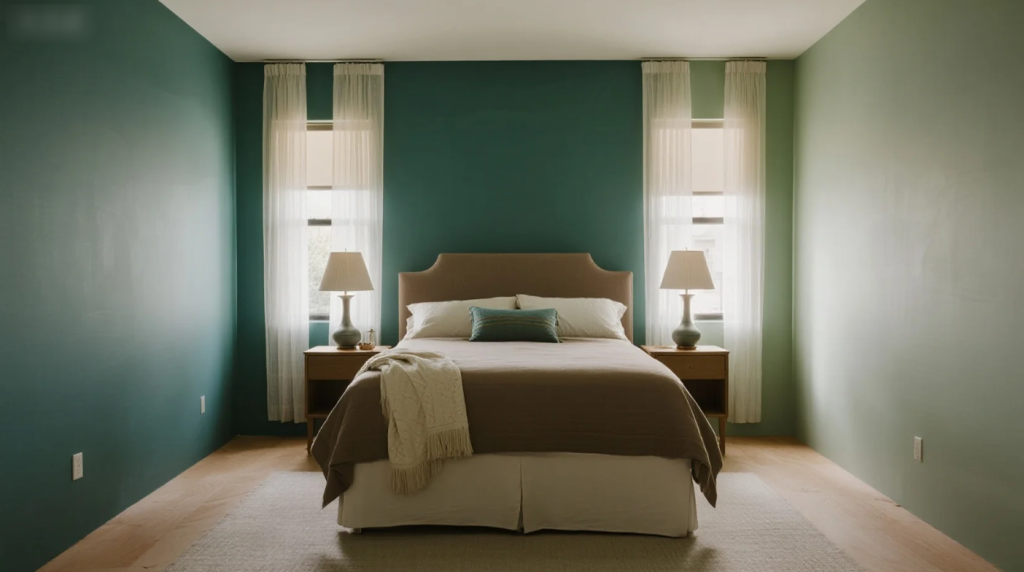Did you know the colors you choose for your bedroom can influence your mood, energy levels, and even your quality of sleep? According to Feng Shui, a traditional Chinese philosophy focused on harmonizing energy (qi), incorporating specific colors into your bedroom can help foster rest, happiness, and emotional balance.

Whether you’re redecorating or looking to enhance tranquility in your space, these six Feng Shui-approved bedroom color choices, backed by expert insights, will guide you toward a more restorative and harmonious sanctuary.
1. Beige and Earthy Browns
If your goal is to create a cozy, grounded atmosphere, look to earth-inspired shades like sand, terracotta, or deep beige. These colors mirror natural landscapes and evoke a sense of peace and stability.
“Nature offers clues for solving many of life’s challenges,” says Julia Sarasola, interior designer and founder of Sarasola Interiors. “Warm earth tones mimic the serenity of a forest or beach and foster the same calming energy in a bedroom.”
Because Feng Shui links the earth element with stability and nourishment, incorporating these tones can help you feel more supported and centered.
2. Cream and Soft Off-Whites
Classic neutrals like cream or warm off-white never go out of style—and they’re perfect for bedrooms, according to Feng Shui.
“These gentle colors create a peaceful, nurturing environment,” says Feng Shui consultant Anjie Cho. “They encourage rest and relaxation, making them ideal for bedrooms where quiet, comforting energy is essential.”
Creamy hues also offer a versatile base, allowing you to layer in textures and accents without disrupting the calm energy.
3. Ochre and Warm Mineral Shades
Looking for a sophisticated yet grounded feel? Shades of ochre, amber, or umber add an earthy richness that’s soothing and timeless. These pigments, derived from natural minerals, are deeply rooted in Feng Shui’s earth element.
“Ochre and similar tones bring warmth and depth to a room,” says Sarasola. “They’re soft, supportive, and provide a sense of gentle strength—much like soil supports plant life.”
Pair ochre with complementary jewel tones like burgundy or teal for a luxurious but calming aesthetic.
4. Light Pink for Emotional Comfort
Light pink might be an unexpected bedroom choice for some, but in Feng Shui, it’s associated with compassion, peace, and emotional balance. Its soft energy helps ease anxiety and supports healthy relationships.
“Muted pinks work subtly on our emotions, helping to reduce stress and promote relaxation,” explains Sarasola.
This color also symbolizes love and warmth—perfect for enhancing romantic energy without overwhelming the space.
5. Soft Green and Blue for Serenity
Green and blue reflect the calming forces of nature—think forests, skies, and oceans. In Feng Shui, they’re connected to the wood element, which symbolizes growth, healing, and renewal.
“Gentle greens and blues have a therapeutic quality,” says Anjie Cho. “They bring in wood energy, which supports vitality and balance in your personal space.”
Choose lighter shades like sage, dusty blue, or celadon to avoid overstimulation while promoting emotional clarity and rest.
6. Accents of Red and Purple to Boost Passion
While bold colors like red or deep purple can be too stimulating for full-room coverage, subtle touches of these hues can enhance romantic or personal energy in the bedroom.
“Tiny pops of red or burgundy can support love and passion,” says Cho. “These colors represent fire energy, which can be helpful when used thoughtfully.”
Incorporate these shades through artwork, pillows, or accessories to avoid overpowering the room’s calming atmosphere.
Colors to Avoid in Feng Shui Bedroom Design
Although Feng Shui doesn’t ban any colors outright, certain shades are less suitable for restful environments. Avoid overly bright tones like neon green or electric blue, which can overstimulate the mind. Likewise, steer clear of dark, moody hues like charcoal gray, which may lead to feelings of heaviness or depression.
“Deep, dark colors can make a space feel too enclosed,” Cho cautions. “While trendy, they often create a sense of emotional withdrawal that makes it harder to wake up and face the day.”
Final Thoughts
Choosing the right bedroom colors isn’t just about style—it’s about supporting your well-being. By incorporating these Feng Shui principles, you can create a bedroom that promotes balance, improves sleep, and invites positive energy into your daily life.
